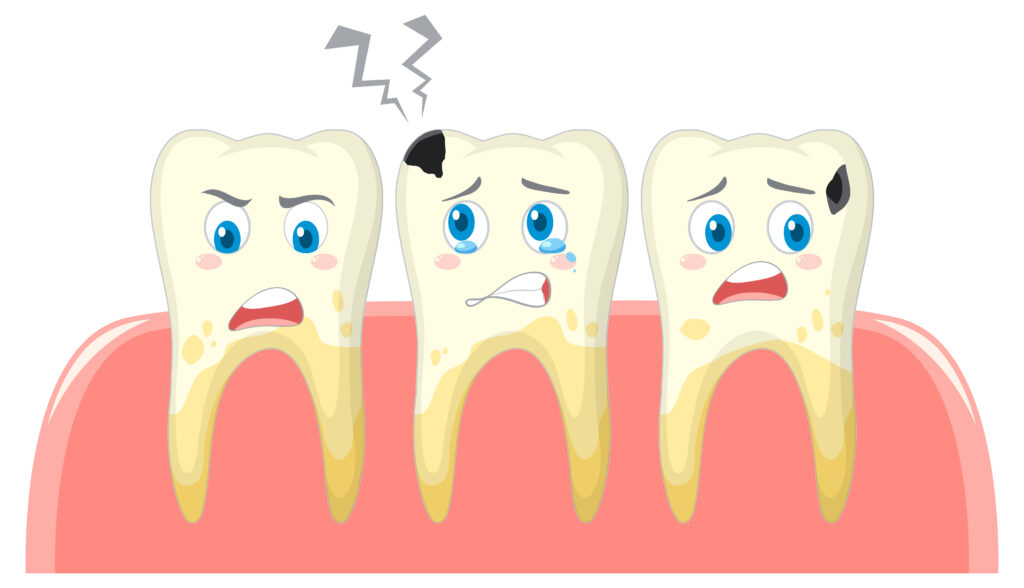Introduction
When it comes to our well-being, oral health plays a pivotal role. The term “cavity” can send a shiver down anyone’s spine. These tiny voids in our teeth have the potential to cause discomfort, pain, and more complex dental problems if not taken seriously. In this comprehensive guide, we’ll explore the world of cavities, with a special focus on small cavities. We’ll uncover their appearance, delve into their origins, and equip ourselves with strategies to prevent their emergence.
Cavities Unveiled: A Brief Overview
To truly understand small cavities, we need to grasp the basics of how cavities come to be. Dental cavities, scientifically known as dental caries, result from a complex interplay of factors. Bacteria that naturally reside in our mouths feed on sugars and starches from our food. This process produces acids that erode the enamel—the protective outer layer of our teeth. Over time, this erosion creates small holes or cavities in the teeth.
The Look of Small Cavities
What’s intriguing about small cavities is their subtle nature, especially in the early stages. Unlike advanced cavities that show visible discoloration or clear holes, small cavities are characterized by subtle features. They often appear as faint, white spots on the tooth’s surface, signaling the initial stages of demineralization. These spots can blend with the natural tooth color, making them hard to spot without a dental professional’s trained eye.
Causes Behind Small Cavities
Effective prevention of small cavities requires a proactive approach:
- Thorough Oral Hygiene: Brush your teeth at least twice daily with fluoride toothpaste. Use proper brushing techniques, spending ample time on each section of your mouth. Also, floss daily to remove food particles and plaque from between teeth and along the gumline.
- Mindful Eating: A balanced diet contributes to overall health and cavity prevention. Limit consumption of sugary and acidic foods, which foster cavity development. Opt for nutrient-rich options like fruits, vegetables, whole grains, lean proteins, and calcium-rich dairy products.
- Harness Fluoride: Fluoride strengthens enamel and enhances resistance against acid attacks. Use fluoride toothpaste and consider fluoride mouthwash. Dentists may recommend professional fluoride treatments for added protection.
- Shield with Sealants: Dental sealants, thin protective coatings applied to molars and premolars, prevent food particles and bacteria buildup, reducing cavity risk.
Unaddressed Small Cavities: Complications and the Call for Early Action
Small cavities, if ignored, can lead to significant complications:
- Progression to Larger Cavities: Untreated small cavities can grow, penetrating deeper layers of the tooth. This causes extensive damage, necessitating more invasive treatments.
- Tooth Sensitivity: As cavities deepen, they expose the sensitive dentin layer, leading to heightened tooth sensitivity to temperature and stimuli.
- Toothache and Discomfort: Cavities reaching the tooth nerve cause persistent discomfort, affecting eating and speaking.
- Infections and Abscesses: Advanced cavities can lead to bacterial infections and dental abscesses, causing swelling and discomfort.
- Spreading to Adjacent Teeth: Neglected cavities can spread, impacting neighboring teeth and causing further decay.
- Potential Tooth Loss: Severe cavities can weaken teeth structurally, necessitating extraction and impacting appearance and functionality.
Acting early prevents complications:
- Minimally Invasive Treatments: Detecting small cavities early enables minimally invasive treatments like dental fillings, preserving more natural tooth material.
- Halt Further Damage: Addressing small cavities promptly prevents progression, averting complex and costly procedures.
- Preserve Sensitivity: Early treatment avoids tooth sensitivity and discomfort linked with advanced cavities.
- Prevent Infections: Early intervention reduces the risk of infections and painful abscesses.
- Sustain Oral Health: Timely action maintains overall oral health and prevents a chain of dental issues.
Oral Hygiene and Preventive Measures: Your Defense
Ensuring optimal oral health through proper hygiene and prevention is crucial:
- Brushing Techniques: Brushing correctly forms the foundation of oral hygiene. Use fluoride toothpaste and a soft-bristle toothbrush. Angle the brush at 45 degrees towards the gumline and use gentle circular motions to clean all tooth surfaces.
- Floss with Care: Flossing complements brushing by cleaning between teeth. Gently guide floss between teeth, forming a C-shape around each tooth and moving it up and down.
- Tongue Care: Clean your tongue to prevent bacteria accumulation and bad breath. Use a tongue scraper or toothbrush.
- Mouthwash Benefits: Antimicrobial mouthwash reduces bacteria and maintains fresh breath. However, it doesn’t replace brushing and flossing.
- Balanced Diet: Nutrient-rich foods support strong teeth. Limit sugary and acidic foods and rinse your mouth after indulging.
- Stay Hydrated: Water flushes away particles, maintaining oral health.
- Sugar-Free Gum: Chewing sugar-free gum stimulates saliva, neutralizing acids.
- Regular Dental Visits: Even with excellent hygiene, professional check-ups are crucial. Detect early signs of cavities, receive cleanings, and personalized advice.
- Stay Informed: Understand cavity causes and consequences for informed decisions.
Answering Your Queries: Small Cavities FAQs
1. What’s a small cavity?
A small cavity is a tiny tooth decay area caused by acid erosion on enamel due to bacteria.
2. Are small cavities painful?
Initially, small cavities may not hurt. But as they deepen, they cause sensitivity and discomfort.
3. Detecting small cavities?
Detecting them isn’t easy. Dental check-ups and X-rays spot them early.
4. Can small cavities heal naturally?
No, damaged enamel can’t regenerate. Early treatment is crucial.
5. Preventing small cavities?
Practicing oral hygiene, balanced diet, and regular dental visits prevent small cavities.
6. Natural remedies for small cavities?
Professional dental treatment is superior to any natural remedy.
7. Children and small cavities?
Yes, children can have small cavities. Good hygiene and dental visits




